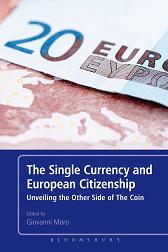Duff, A. and Verhofstadt, G., (2013), “Europe: an end to fallacy”, European Politics and Policy Blog, 08 Οκτωβρίου. The Eurozone crisis has generated a number of structural reforms at the European level. In light of the democratic implications of some of these reforms, Andrew Duff and Guy Verhofstadt propose a new ‘fundamental law’ to replace the EU’s existing treaty framework. This incorporates a federal union in which the European Commission …Read More
Τα κροκοδείλια δάκρυα του Ταμείου
Χρυσολωράς, Ν., (2013), “Τα κροκοδείλια δάκρυα του Ταμείου”, Η Καθημερινή, 08 Οκτωβρίου. Τι μας λένε τα απόρρητα έγγραφα και πρακτικά από συνεδριάσεις του ΔΝΤ, τα οποία έφερε στο φως της δημοσιότητας η εφημερίδα Wall Street Journal; Ότι το Ταμείο -ή ακριβέστερα: ο Αιγύπτιος, Ιρανός, Βραζιλιάνος και μερικοί ακόμη εθνικοί εκπρόσωποι στο Ταμείο- από την ασφαλή απόσταση του προτιμητέου πιστωτή, ο οποίος παίρνει πάντοτε τα χρήματά του πίσω και την ηρεμία …Read More
State Crisis and Civil Consciousness in Greece
Marangudakis, M., Rontos, K. and Xenitidou, M., (2013), “State Crisis and Civil Consciousness in Greece”, Hellenic Observatory Papers on Greece and Southeast Europe, GreeSE Paper No.77, Οκτώβριος. This is a sociological study of the self in modern Greece. Based upon a pilot study of social and political attitudes in Greece today, the study probes the sources of the moral self and of the internalized cosmological and ontological principles in Greece …Read More
Angela Merkel’s Pyrrhic Victory
Soros, G., (2013), “Angela Merkel’s Pyrrhic Victory”, Project Syndicate, 07 Οκτωβρίου. As far as Germany is concerned, the drama of the euro crisis is over. The subject was barely discussed in the country’s recent election campaign. Chancellor Angela Merkel did what was necessary to ensure the euro’s survival, and she did so at the least possible cost to Germany – a feat that earned her the support of pro-European Germans …Read More
Μπορούμε να βγούμε στις αγορές το 2014;
Καλλίτσης, Κ., (2013), “Μπορούμε να βγούμε στις αγορές το 2014;”, Η Καθημερινή, 07 Οκτωβρίου. Τον Ιούνιο του 2014 οι Ευρωπαίοι θα μας δώσουν την τελευταία δόση που μας οφείλουν από το δανειακό πακέτο των 240 δισ. και θα απομείνουν οι μικρές δόσεις από το ΔΝΤ που εξαντλούνται στα τέλη του 2016. Το μνημόνιο ουσιαστικά λήγει και, πλέον, δύο είναι τα σενάρια της επόμενης μέρας: (α) Να βγει η Ελλάδα στις …Read More
European Media Distort the Lessons of Argentina’s Crisis and Recovery
Mercille, J., (2013), “European Media Distort the Lessons of Argentina’s Crisis and Recovery”, Social Europe Journal, 07 Οκτωβρίου. The European media have distorted the lessons of Argentina’s relatively successful response to its own economic crisis a decade ago, as newly published research documents in detail. This is not surprising, because the policies adopted by Buenos Aires were directly opposed to those currently favoured by European authorities, in particular the ECB …Read More
The Euro crisis and its impact on national and European social policies
Degryse, C., Jepsen, M. and Pochet, P., (2013), “The Euro crisis and its impact on national and European social policies”, European Trade Union Institute, Working Paper 2013.05, Οκτώβριος. This critical working paper looks at the series of political choices, circumstances and windows of opportunity that have enabled one particular vision of the model of EU monetary union to gain acceptance. In the context of this model, political union is not …Read More
Can demography explain Portugal’s growth slump before the crash?
Hugh, E., (2013), “Can demography explain Portugal’s growth slump before the crash?”, A Fistful Of Euros Blog, 06 Οκτωβρίου. The issue being raised revolves around the current acceleration of emigration from countries on the EU periphery, largely towards the EU core. Typically the emigrants are young educated people who can’t find work. There is nothing especially surprising in this, since the tendency has long existed for people to move from …Read More
The Single Currency and European Citizenship: Unveiling the Other Side of The Coin
Moro, G. ed., (2013), The Single Currency and European Citizenship: Unveiling the Other Side of The Coin, London: Bloomsbury Academic. Established in 2002, the Euro is now the currency of 17 countries used by over 335 million people daily. Although the single currency is much discussed in terms of macroeconomics and global finances, policymakers rarely address its impact on European citizenship in social, cultural, political, and everyday life economics terms. …Read More
The Legacy of Austerity in the Eurozone
De Grauwe, P. and Ji, Y., (2013), “The Legacy of Austerity in the Eurozone”, Centre for European Policy Studies, 04 Οκτωβρίου. The recent slight improvement in the GDP growth rates in the eurozone has led European policy-makers to proclaim victory and assert that the austerity programmes imposed within the eurozone are paying off. But is this really the case? In this Commentary Paul De Grauwe and Yuemei Ji argue that …Read More





